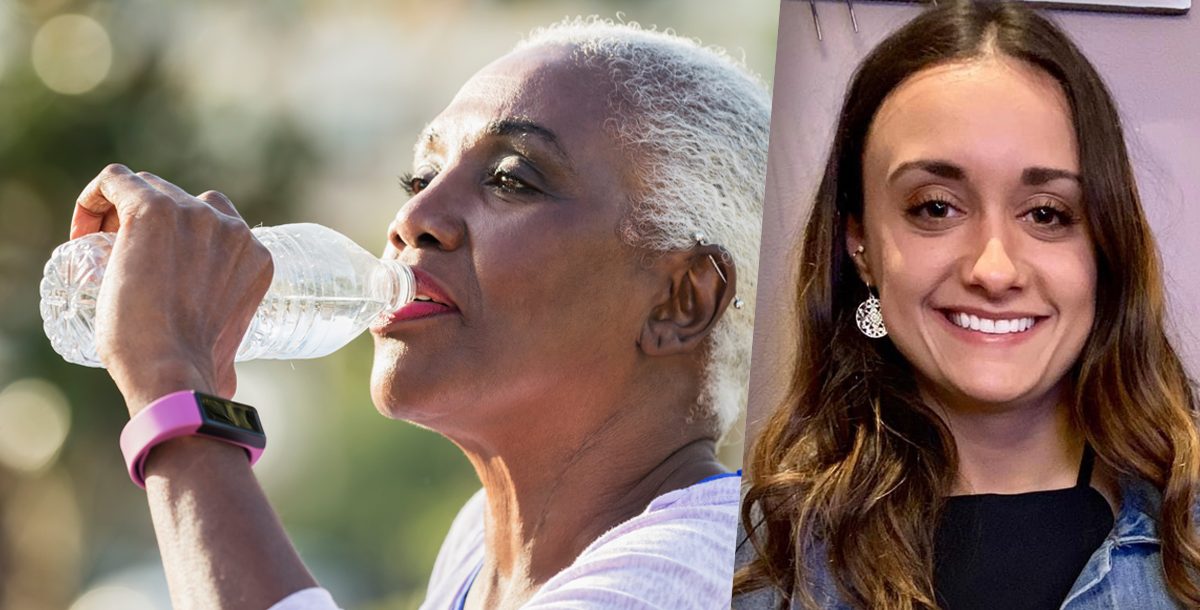Did you know that staying hydrated is one of the most important elements of health? By doing so, you are ensuring that your body is working properly – and that you are staying clear of the health issues that dehydration presents.
“It is recommended that women have a daily intake of 11.5 cups of fluids and 15.5 cups for men, but the suggested intake can change in relation to age, health status and physical activity level,” Brianna Grande, a cardiopulmonary dietitian with Bon Secours St. Francis, explains.
For many, ensuring you are achieving the recommended daily water intake is easier to do than you may think.
“The recommended daily fluid intake doesn’t just refer to water, but refers to total water intake, which includes foods and other beverages as well,” Brianna explains.
Below, Brianna unpacks the details of hydration and dehydration as well as how you can stay hydrated during the hot months of summer.
Why is staying hydrated important?
“Being hydrated keeps all our body systems working properly, from digestion, nutrient absorption, joint lubrication and even our body temperature regulation,” Brianna shares. “It is important to stay hydrated all year round, but it is especially important during the hotter months or when you are partaking in heavy exercise as your body loses more water during these times.”
What are the dangers of not drinking enough water?
“By not drinking enough water, your body will become dehydrated, meaning there is not enough water or fluids in your system for your body to function properly.
The signs and symptoms of dehydration differ with age. For older adults, whose thirst declines with age, they become more susceptible to dehydration. Low blood pressure and rapid heartbeat are two of the most common dangers of dehydration. More symptoms of dehydration vary but include headache, fatigue, cramps and a sudden change in mood and cognition.
Although the symptoms and dangers of dehydration vary, there is one easy way to determine if you are dehydrated. The appearance of your urine is the best way to judge if you are dehydrated or not. If your urine is dark like apple juice, you need more fluid. But if it’s light like lemonade, you’re in the clear.”
What foods or drinks contribute to dehydration?
“There are several foods and drinks that contribute to dehydration. Anything with a high sodium or sugar content can and will cause you to become dehydrated faster. Fried foods and salty snacks, as well as alcoholic beverages and sugary drinks also contribute to dehydration.”
What drinks, besides water, are a good source of hydration?
“Coffee and tea contribute greatly to water intake, and it is comforting to know they are not dehydrating despite the caffeine content they contain.
Milks and juices are another great source that will ensure your hydration levels are where they need to be. In fact, almost anything with a high water content will do the job.
If you aren’t the biggest fan of the taste of water, try using flavored powders to enhance the taste and spice it up some. Lemons and limes are also a great way to change the flavor, but to also ensure that you are still reaching the needed daily intake. Just make sure that whichever enhancer you choose is one with minimal added sugars.
What foods can help you stay hydrated?
“Typically, 20 percent of the water needed to live a healthy lifestyle comes from food. This is why it’s important to ensure that you are eating foods with a high water content. Fruits and veggies are a perfect food to include in your diet as some even have a 90 to 99 percent water content. Water-based broths and soups also make a good addition to your diet and can help you reach your hydration levels, too.”
Overall, your lifestyle plays a large role when it comes to both hydration and dehydration. Make sure you have the tools needed to keep your body hydrated.
Learn more about the nutrition services we provide at Bon Secours.





